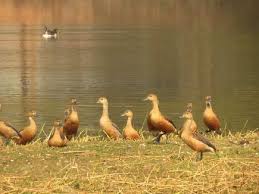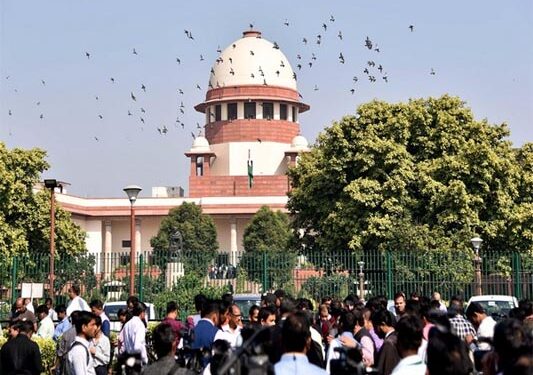- The top court directed that the Rajasthan and the Gujarat governments as well as private power producers ensure that a comprehensive exercise is undertaken and completed within a period of three weeks to assess the total length of electricity transmission lines and the estimated number of bird divertors required for the purpose in the priority areas.
- The apex court’s order came on a plea filed by retired IAS officer MK Ranjitsinh and others through advocate Sonia Dube
NE NEWS SERVICE
NEW DELHI, APRIL 24
In a bid to protect the endangered Great Indian Bustard and Lesser Florican, the Supreme Court has directed private and state owned power producers of Gujarat and Rajasthan to complete installation of bird divertors in priority areas before July 20.

The top court directed that the Rajasthan and the Gujarat governments as well as private power producers ensure that a comprehensive exercise is undertaken and completed within a period of three weeks to assess the total length of electricity transmission lines and the estimated number of bird divertors required for the purpose in the priority areas.
A bench of justices DY Chandrachud, AS Bopanna and V Ramasubramanian said that the court-appointed three members committee will in consultation with the Central Electricity Authority (CEA) within a month formulate the standards of quality required for the bird divertors so that uniformity can be maintained in the standards to be observed.
The bench in its recent order noted that during the course of the hearing, it has emerged that none of the parties before the court or the intervenors have any objection to the installation of bird divertors, reports PTI.
“Though in the interlocutory application (IA), which has been filed before the court by the State of Rajasthan, an attempt has been made to indicate the steps which have been taken, the progress has been deficient in all respect,” it noted.
The bench directed, “The installation of bird divertors at least in the priority areas of the states of Gujarat and Rajasthan must be taken up with the utmost expedition.” “The installation of bird divertors in the priority areas shall be completed before July 20, 2022, when these proceedings shall be taken up for further direction. This direction shall govern all State owned as well as private power producers,” it said.
The apex court’s order came on a plea filed by retired IAS officer MK Ranjitsinh and others through advocate Sonia Dube.
The plea seeks the court’s directions for an urgent emergency response plan to protect and ensure the recovery of numbers of the endangered Great Indian Bustard (GIB) and Lesser Florican (LF).
The bench said that necessary steps will be taken immediately, thereafter, for ensuring that the time schedule of completing the installation of bird divertors in the priority areas associated with the Great Indian Bustard and the Lesser Florican is observed by all power producers in Gujarat and Rajasthan.
It added that in terms of the previous order dated April 19, 2021, any company which seeks an exemption from the direction to install underground transmission lines shall be at liberty to move the committee which has been constituted by the court and any grievance may be submitted before the court.
“The injunction which has been imposed in the order of this court from the installation of fresh overhead transmission lines, save with the approval of the committee, shall be scrupulously enforced”, the bench said after the committee pointed out that it has received reports in regard to the ongoing installation of power lines despite the court’s directions.
It said, “The states of Gujarat and Rajasthan as well as private power producers shall ensure that there is no breach of the directions of this court.” “As already noted earlier, the feasibility of and need for installation of fresh overhead transmission lines is being examined by the committee on a case to case basis and hence, applicants have sufficient remedies in the first instance to approach the committee, and thereafter move this court, if there be any subsisting grievance,” the bench said.
The top court noted that the status report indicates that the committee received eight applications for exemption from the requirement of setting up underground transmission lines.
It said, “The committee has tabulated the status of the applications. The committee has obtained a technical report from the Central Electricity Authority on the feasibility of undergrounding 400 kV and 765 kV transmission lines.” “The committee has also sought a technical report from CEA on undergrounding 66 kV and 220 kV transmission lines to which a reply is awaited,” it said.
The bench noted that the tabulated chart of the status report indicates that out of the eight applications which were submitted to it, the committee has approved two applications on the receipt of CEA’s technical report permitting the laying of overhead transmission lines subject to the installation of bird divertors and the remaining six applications are at various stages of scrutiny upon which a decision is expected to be taken by the committee.
On March 31, the top court had directed the Rajasthan and the Gujarat governments to file their status reports on converting overhead electric cables into underground power lines, wherever feasible, within a year to protect the endangered GIB from extinction.
On April 19 last year, the top court, in a bid to save the GIB, directed the Gujarat and the Rajasthan governments to convert overhead electric cables into underground power cables, wherever feasible, within a year.
It had set up a three-member committee to assess the feasibility for the laying of high-voltage underground power cables.
The committee comprises scientists Rahul Rawat, Sutirtha Dutta and Devesh Gadhavi, deputy director of Corbett Foundation.









